- Home
- Ian Fleming
The Hildebrandt rarity Page 3
The Hildebrandt rarity Read online
Page 3
Fidele Barbey’s schnorkel was only a hundred yards away. They had nearly completed the circuit.
They came up with each other and swam to the shore and lay on the hot sand. Fidele Barbey said: “Nothing on my side of the property except every fish in the world bar one. But I’ve had a stroke of luck. Ran into a big colony of green snail. That’s the pearl shell as big is a small football. Worth quite a lot of money. I’ll send one of my boats after them one of these days. Saw a blue parrot-fish that must have been a good thirty pounds. Tame as a dog, like all the fish round here. Hadn’t got the heart to kill it. And if I had, there might have been trouble. Saw two or three leopard sharks cruising around over the reef. Blood in the water might have brought them through. Now I’m ready for a drink and something to eat. After that we can swap sides and have another go.”
They got up and walked along the beach to the tent. Mr Krest heard their voices and came out to meet them. “No dice, eh?” He scratched angrily at an arm pit. “Goddam sandfly bit me. This is one hell of a god-awful island. Liz couldn’t stand the smell. Gone back to the ship. Guess we’d better give it one more going-over and then get the hell out of here. Help yourselves to some chow and you’ll find cold beer in the icepack. Here, gimme one of those masks. How do you use the dam’ things? I guess I might as well take a peek at the sea’s bottom while I’m about it.”
They sat in the hot tent and ate the chicken salad and drank beer, and moodily watched Mr Krest poking and peering about in the shallows. Fidele Barbey said: “He’s right, of course. These little islands are bloody awful places. Nothing but crabs and bird dung surrounded by too dam’ much sea. It’s only the poor bloody frozen Europeans that dream of coral islands. East of Suez, you won’t find any sane man who gives a damn for them. My family owns about ten of them - decent-sized ones too, with small villages on them and a good income from copra and turtle. Well, you can have the whole bloody lot in exchange for a flat in Paris or London.”
Bond laughed. He began: “Put an advertisement in The Times and you’d get sackloads...” when, fifty yards away, Mr Krest began to make frantic signals. Bond said: “Either the bastard’s found it or he’s trodden on a guitar-fish,” and picked up his mask and ran down to the sea.
Mr Krest was standing up to his waist among the shallow beginnings of the reef. He jabbed his finger excitedly at the surface. Bond swam softly forward. A carpet of sea-grass ended in broken coral and an occasional niggerhead. A dozen varieties of butterfly and other reef-fish flirted among the rocks, and a small langouste quested towards Bond with its feelers. The head of a large green moray protruded from a hole, its half-open jaws showing the rows of needle teeth. Its golden eyes watched Bond carefully. Bond was amused to note that Mr Krest’s hairy legs, magnified into pale tree-trunks by the glass, were not more than a foot away from the moray’s jaws. He gave an encouraging poke at the moray with his spear, but the eel only snapped at the metal points and slid back out of sight. Bond stopped and floated, his eyes scanning the brilliant jungle. A red blur materialized through the far mist and came towards him. It circled closely beneath him as if showing itself off. The dark blue eyes examined him without fear. The small fish busied itself rather self-consciously with some algae on the underside of a niggerhead, made a dart at a speck of something suspended in the water, and then, as if leaving the stage after showing its paces, swam languidly off back into the mist.
Bond backed away from the moray’s hole and put his feet to the ground. He took off his mask. He said to Mr Krest, who was standing gazing impatiently at him through his goggles: “Yes, that’s it all right. Better move quietly away from here. He won’t go away unless he’s frightened. These reef-fish stick pretty well to the same pastures.”
Mr Krest pulled off his mask. “Goddam, I found it!” he said reverently. “Well, goddam I did.” He slowly followed Bond to the shore.
Fidele Barbey was waiting for them. Mr Krest said boisterously: “Fido, I found that goddam fish. Me - Milton Krest. Whadya know about that? After you two goddam experts had been at it all morning. I just took that mask of yours - first time I ever put one on, mark you - and I walked out and found the goddam fish in fifteen minutes flat. Whadya say to that eh, Fido?”
“That’s good, Mr Krest. That’s fine. Now how do we catch it?”
“Aha.” Mr Krest winked slowly. “I got just the ticket for that. Got it from a chemist friend of mine. Stuff called Rotenone. Made from derris root. What the natives fish with in Brazil. Just pour it in the water, where it’ll float over what you’re after, and it’ll get him as sure as eggs is eggs. Sort of poison. Constricts the blood vessels in their gills. Suffocates them. No effect on humans because no gills, see?” Mr Krest turned to Bond. “Here, Jim. You go on out and keep watch. See the darned fish don’t vamoose. Fido and I’ll bring the stuff out there” - he pointed up-current from the vital area. “I’ll let go the Rotenone when you say the word. It’ll drift down towards you. Right? But for lands sakes get the timing right. I’ve only got a five-gallon tin of this stuff. ‘Kay?”
Bond said “All right,” and walked slowly down and into the water. He swam lazily out to where he had stood before. Yes, everyone was still there, going about his business. The moray’s pointed head was back again at the edge of its hole, the langouste again queried him. In a minute, as if it had a rendezvous with Bond, the Hildebrand Rarity appeared. This time it swam up quite close to his face. It looked through the glass at his eyes and then, as if disturbed by what it had seen there, darted out of range. It played around among the rocks for a while and then went off into a mist.
Slowly the little underwater world within Bond’s vision began to take him for granted. A small octopus that had been camouflaged as a piece of coral revealed its presence and groped carefully down towards the sand. The blue and yellow langouste came a few steps out from under the rock, wondering about him. Some, very small fish like minnows nibbled at his legs and toes, tickling. Bond broke a sea-egg for them and they darted to the better meal. Bond lifted his head. Mr Krest, holding the flat can, was twenty yards away to Bond’s right. He would soon begin pouring, when Bond gave the sign, so that the liquid would get a good wide spread over the surface.
“Okay?” called Mr Krest.
Bond shook his head. “I’ll raise my thumb when he’s back here. Then you’ll have to pour fast.”
“Okay, Jim. You’re at the bomb-sight.”
Bond put his head down. There was the little community, everyone busied with his affairs. Soon, to get one fish that someone vaguely wanted in a museum five thousand miles away, a hundred, perhaps a thousand small people were going to die. When Bond gave the signal, the shadow of death would come down on the stream. How long would the poison last? How far would it travel on down the reef? Perhaps it would not be thousands but tens of thousands that would die.
A small trunk-fish appeared, its tiny fins whirring like propellers. A rock beauty, gorgeous in gold and red and black, pecked at the sand, and a pair of the inevitable black and yellow striped sergeant-majors materialized from nowhere, attracted by the scent of the broken sea-egg.
Inside the reef, who was the predator in the world of small fishes? Who did they fear? Small barracuda? An occasional bill-fish? Now, a big, a fully grown predator, a man called Krest, was standing in the wings, waiting. And this one wasn’t even hungry. He was just going to kill – almost for fun.
Two brown legs appeared in Bond’s vision. He looked up. It was Fidele Barbey with a big creel strapped to his chest, and long-handled landing-net.
Bond lifted his mask. “I feel like the bomb-aimer at Nagasaki.”
“Fish are cold-blooded. They don’t feel anything.”
“How do you know? I’ve heard them scream when they’re hurt.”
Barbey said indifferently: “They won’t be able to scream with this stuff. It strangles them. What’s eating you? They’re only fish.”
“I know, I know.” Fidele Barbey had spent his life killing animals an
d fish. While he, Bond, had some times not hesitated to kill men. What was he fussing about? He hadn’t minded killing the sting-ray. Yes, but that was an enemy fish. These down here were friendly people. People? The pathetic fallacy!
“Hey!” came the voice of Mr Krest. “What’s goin on over there? This ain’t no time for chewing the fat. Get that head down, Jim.”
Bond pulled down his mask and lay again on the surface. At once he saw the beautiful red shadow coming out of the far mists. The fish swam fast up to him as if it now took him for granted. It lay below him, looking up. Bond said into his mask: “Get away from here, damn you.” He gave a sharp jab at the fish with his harpoon. The fish fled back into the mist. Bond lifted his head and angrily raised his thumb. It was a ridiculous and petty act of sabotage of which he was already ashamed. The dark brown oily liquid was pouring out on to the surface of the lagoon. There was time to stop Mr Krest before it was all gone - time to give him another chance at the Hildebrand Rarity. Bond stood and watched until the last drop was tilted out. To hell with Mr Krest!
Now the stuff was creeping slowly down on the current - a shiny, spreading stain which reflected the blue sky with a metallic glint. Mr Krest, the giant reaper, was wading down with it. “Get set, fellers,” he called cheerfully. “It’s right up with you now.”
Bond put his head back under the surface. Every thing was as before in the little community. And then, with stupefying suddenness, everyone went mad. It was as if they had all been seized with St Vitus’s dance. Several fish looped the loop crazily and then fell like heavy leaves to the sand. The moray eel came slowly out of the hole in the coral, its jaws wide. It stood carefully upright on its tail and gently toppled side ways. The small langouste gave three kicks of its tail and turned over on its back, and the octopus let go its hold of the coral and drifted to the bottom upside down. And then into the arena drifted the corpses from up-stream - whitebellied fish, shrimps, worms, hermit crabs, spotted and green morays, langoustes of all sizes. As if blown by some light breeze of death the clumsy bodies, their colours already fading, swept slowly past. A five-pound bill-fish struggled by with snapping beak, fighting death. Down-reef there were splashes on the surface as still bigger fish tried to make for safety. One by one, before Bond’s eyes, the sea-urchins dropped off the rocks to make black ink-blots on the sand.
Bond felt a touch on his shoulder. Mr Krest’s eyes were bloodshot with the sun and glare. He had put white sunburn paste on his lips. He shouted impatiently at Bond’s mask, “Where in hell’s our goddam fish?”
Bond lifted his mask. “Looks as if it managed to get away just before the stuff came down. I’m still watching for it.”
He didn’t wait to hear Mr Krest’s reply but got his head quickly under water again. Still more carnage, still more dead bodies. But surely the stuff had passed by now. Surely the area was safe just in case the fish, his fish because he had saved it, came back again! He stiffened. In the far mists there was a pink flash. It had gone. Now it was back again. Idly the Hildebrand Rarity swam towards him through the maze of channels between the broken outposts of the reef.
Not caring about Mr Krest, Bond raised his free hand out of the water and brought it down with a sharp slap. Still the fish came. Bond shifted the safe on his harpoon-gun and fired it in the direction of the fish. No effect. Bond put his feet down and began to walk towards the fish through the scattering of corpses. The beautiful red and black fish seemed to pause and quiver. Then it shot straight through the water towards Bond and dived down to the sand at his feet and lay still. Bond only had to bend to pick it up. There was not even a last flap from the tail. It just filled Bond’s hand, lightly pricking the palm with the spiny black dorsal fin. Bond carried it back under-water so as to preserve its colours. When he got to Mr Krest he said “Here,” and handed him the small fish. Then he swam away towards the shore.
That evening, with the Wawekrest heading for home down the path of a huge yellow moon, Mr Krest gave orders for what he called a ‘wingding’. “Gotta celebrate, Liz. This is terrific, a terrific day. Cleaned up the last target and we can get the hell out of these goddam Seychelles and get on back to civilization. What say we make it to Mombasa when we’ve taken on board the tortoise and that goddam parrot? Fly to Nairobi and pick up a big plane for Rome, Venice, Paris - anywheres you care for. What say, treasure?” He squeezed her chin and cheeks in his big hand and made the pale lips pout. He kissed them drily. Bond watched the girl’s eyes. They had shut tight. Mr Krest let go. The girl massaged her face. It was still white with his finger-marks.
“Gee, Milt,” she said half laughing, “you nearly squashed me. You don’t know your strength. But do let’s celebrate. I think that would be lots of fun. And that Paris idea sounds grand. Let’s do that, shall we? What shall I order for dinner?”
“Hell - caviar of course.” Mr Krest held his hands apart. “One of those two-pound tins from Hammacher Schlemmer - the grade ten shot size, and all the trimmings. And that pink champagne.” He turned to Bond. “That suit you, feller?”
“Sounds like a square meal.” Bond changed the subject. “What have you done with the prize?”
“Formalin. Up on the boat-deck with some other jars of stuff we’ve picked up here and there - fish, shells. All safe in our home morgue. That’s how we were told to keep the specimens. We’ll airmail that damned fish when we get back to civilization. Give a Press conference first. Should make a big play in the papers back home. I’ve already radioed the Smithsonian and the news agencies. My accountants’ll sure be glad of some Press cuttings to show those darned revenue boys.”
Mr Krest got very drunk that night. It did not show greatly. The soft Bogart voice became softer and slower. The round, hard head turned more deliberately on the shoulders. The lighter’s flame took increasingly long to relight the cigar, and one glass was swept off the table. But it showed in the things Mr Krest said. There was a violent cruelty, a pathological desire to wound, quite near the surface in the man. That night, after dinner, the first target was James Bond. He was treated to a soft-spoken explanation as to why Europe, with England and France in the van, was a rapidly diminishing asset to the world. Nowadays, said Mr Krest, there were only three powers - America, Russia and China. That was the big poker game and no other country had either the chips or the cards to come into it. Occasionally some pleasant little country - and he admitted they’d been pretty big league in the past - like England would be lent some money so that they could take a hand with the grown-ups. But that was just being polite like one sometimes had to be - to a chum in one’s club who’d gone broke. No. England - nice people, mind you, good sports - was a place to see the old buildings and the Queen and so on. France? They only counted for good food and easy women. Italy? Sunshine and spaghetti. Sanatorium, sort of. Germany? Well, they still had some spunk, but two lost wars had knocked the heart out of them. Mr Krest dismissed the rest of the world with a few similar tags and then asked Bond for his comments.
Bond was thoroughly tired of Mr Krest. He said he found Mr Krest’s point of view oversimplified - he might even say naive. He said: “Your argument reminds me of a rather sharp aphorism I once heard about America. Care to hear it?”
“Sure, sure.”
“It’s to the effect that America has progressed from infancy to senility without having passed through a period of maturity.”
Mr Krest looked thoughtfully at Bond. Finally he said: “Why, say, Jim, that’s pretty neat.” His eyes hooded slightly as they turned towards his wife. “Guess you’d kinda go along with that remark of Jim’s, eh, treasure? I recall you saying once you reckoned there was something pretty childish about the Americans. Remember?”
“Oh Milt.” Liz Krest’s eyes were anxious. She had read the signs. “How can you bring that up? You know it was only something casual I said about the comic sections of the papers. Of course I don’t agree with what James says. Anyway, it was only a joke, wasn’t it, James?”
“That’s right,
” said Bond. “Like when Mr Krest said England had nothing but ruins and a queen.”
Mr Krest’s eyes were still on the girl. He said softly: “Shucks, treasure. Why are you looking so nervous? Course it was a joke.” He paused. “And one I’ll remember, treasure. One I’ll sure remember.”
Bond estimated that by now Mr Krest had just about one whole bottle of various alcohols, mostly whisky, inside him. It looked to Bond as if, unless Mr Krest passed out, the time was not far off when Bond would have to hit Mr Krest just once very hard on the jaw. Fidele Barbey was now being given the treatment. “These islands of yours, Fido. When I first looked them up on the map I thought it was just some specks of fly-dirt on the page.” Mr Krest chuckled. “Even tried to brush them off with the back of my hand. Then I read a bit about them and it seemed to me my first thoughts had just about hit the nail on the head. Not much good for anything, are they, Fido? I wonder an intelligent guy like you doesn’t get the hell out of there. Beach-combing ain’t any kind of a life. Though I did hear one of your family had logged over a hundred illegitimate children. Mebbe that’s the attraction, eh, feller?” Mr Krest grinned knowingly.

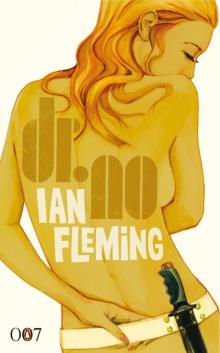 Doctor No
Doctor No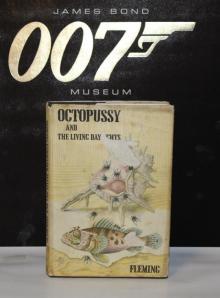 Octopussy & the Living Daylights
Octopussy & the Living Daylights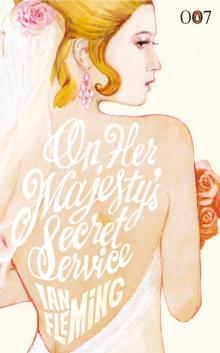 On Her Majestys Secret Service
On Her Majestys Secret Service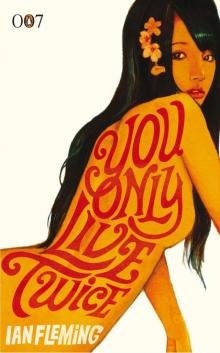 You Only Live Twice
You Only Live Twice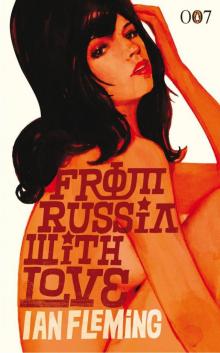 From Russia With Love
From Russia With Love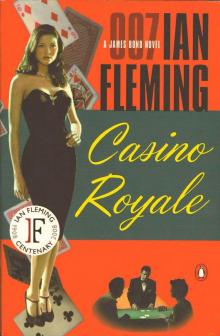 Casino Royale
Casino Royale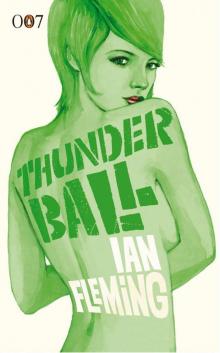 Thunderball
Thunderball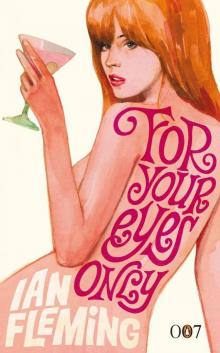 For Your Eyes Only
For Your Eyes Only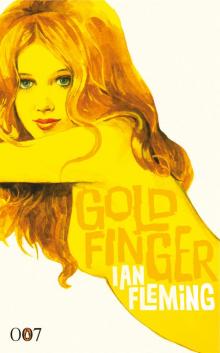 Goldfinger
Goldfinger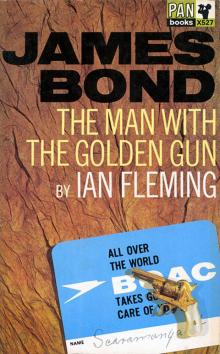 The Man With the Golden Gun
The Man With the Golden Gun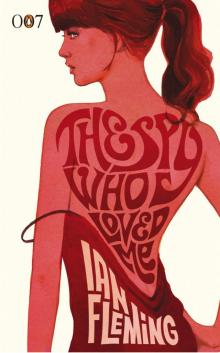 The Spy Who Loved Me
The Spy Who Loved Me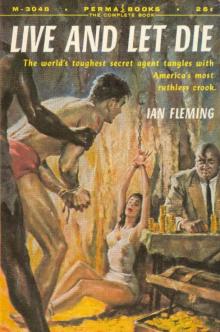 Live and Let Die
Live and Let Die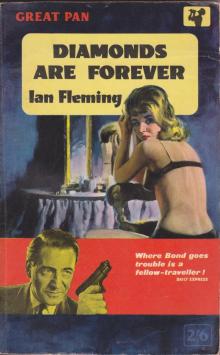 Diamonds Are Forever
Diamonds Are Forever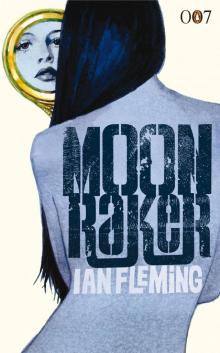 Moonraker
Moonraker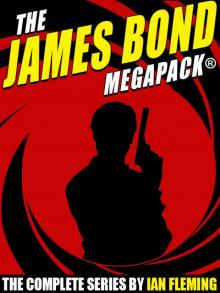 The James Bond MEGAPACK®
The James Bond MEGAPACK®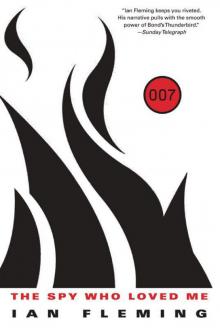 Bond 10 - The Spy Who Loved Me
Bond 10 - The Spy Who Loved Me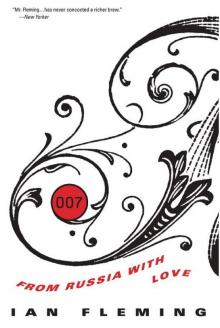 From Russia with Love (James Bond - Extended Series Book 5)
From Russia with Love (James Bond - Extended Series Book 5)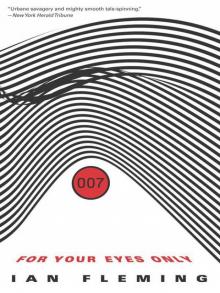 Bond 08 - For Your Eyes Only
Bond 08 - For Your Eyes Only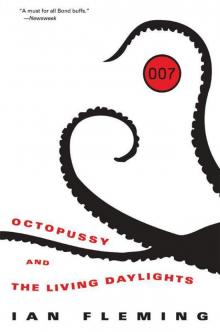 Bond 14 - Octopussy and the Living Daylights
Bond 14 - Octopussy and the Living Daylights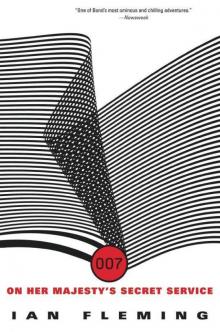 Bond 11 - On Her Majesty's Secret Service
Bond 11 - On Her Majesty's Secret Service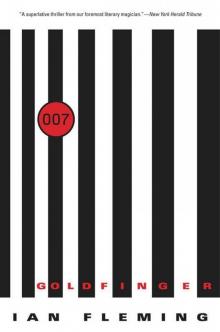 Bond 07 - Goldfinger
Bond 07 - Goldfinger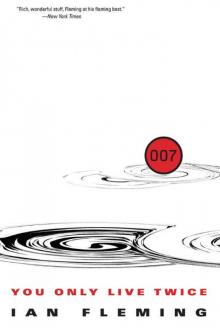 Bond 12 - You Only Live Twice
Bond 12 - You Only Live Twice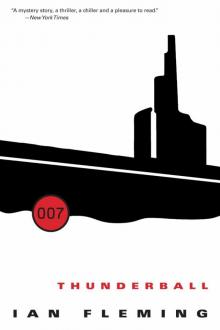 Bond 09 - Thunderball
Bond 09 - Thunderball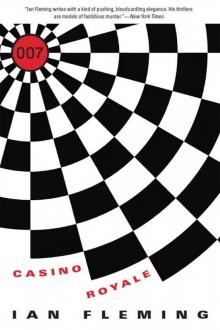 Bond 01 - Casino Royale
Bond 01 - Casino Royale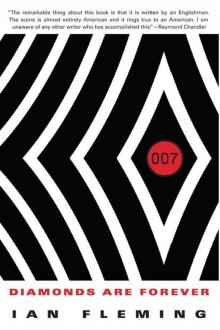 Diamonds are Forever (James Bond - Extended Series Book 4)
Diamonds are Forever (James Bond - Extended Series Book 4)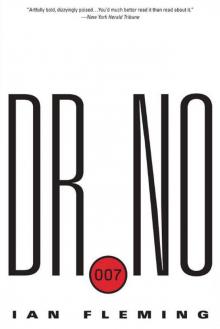 Bond 06 - Dr. No
Bond 06 - Dr. No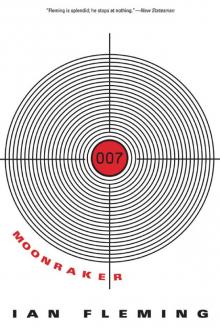 Moonraker (James Bond - Extended Series Book 3)
Moonraker (James Bond - Extended Series Book 3)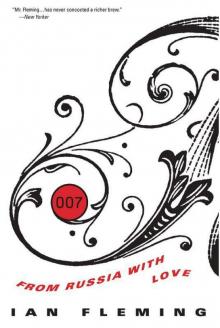 Bond 05 - From Russia With Love
Bond 05 - From Russia With Love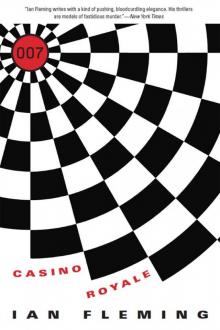 Casino Royale (James Bond - Extended Series Book 1)
Casino Royale (James Bond - Extended Series Book 1)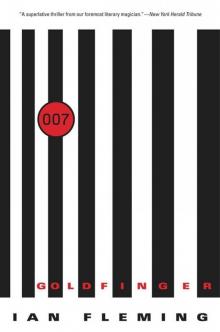 Goldfinger (James Bond - Extended Series Book 7)
Goldfinger (James Bond - Extended Series Book 7)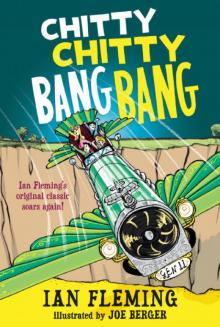 Chitty Chitty Bang Bang: The Magical Car
Chitty Chitty Bang Bang: The Magical Car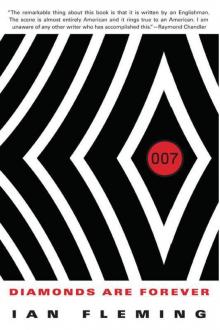 Bond 04 - Diamonds Are Forever
Bond 04 - Diamonds Are Forever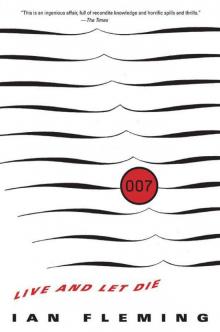 Bond 02 - Live and Let Die
Bond 02 - Live and Let Die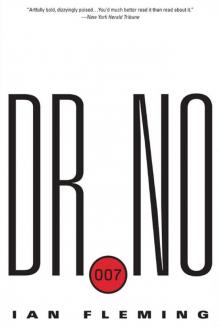 Dr. No (James Bond - Extended Series Book 6)
Dr. No (James Bond - Extended Series Book 6) The Hildebrandt rarity
The Hildebrandt rarity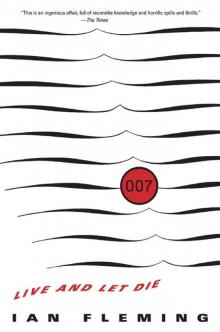 Live and Let Die (James Bond - Extended Series Book 2)
Live and Let Die (James Bond - Extended Series Book 2)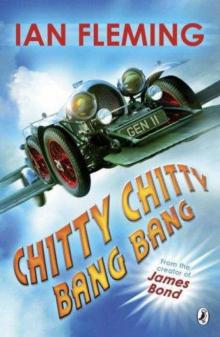 Chitty Chitty Bang Bang
Chitty Chitty Bang Bang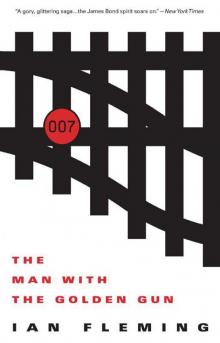 Bond 13 - The Man With the Golden Gun
Bond 13 - The Man With the Golden Gun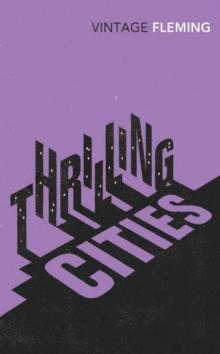 Thrilling Cities
Thrilling Cities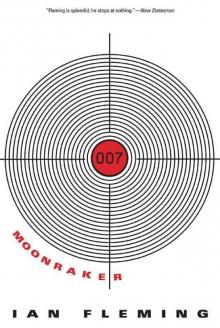 Bond 03 - Moonraker
Bond 03 - Moonraker